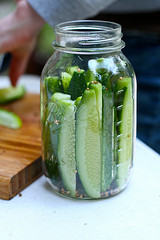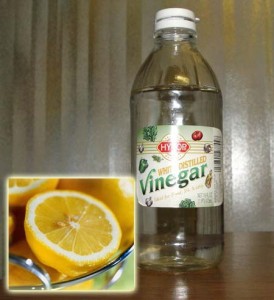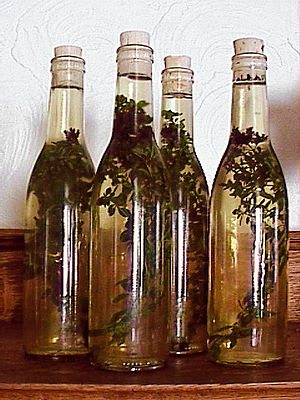The New York Times just published an article indicating that pickle juice (made of salt, vinegar and spices) was helpful at relieving muscle cramps. In a very small trial, 10 men exercised until dehydrated then were electrically stimulated until they cramped, and were given either pickle juice or water. Pickle juice relieved cramps significantly compared to distilled water. The trainers thought that the pickle juice replaced fluids and electrolytes lost during exercise. The researchers thought it was the vinegar. And many of the readers commented that vinegar alone had relieved cramps for them. (One even thought the vinegar in mustard did the same.) Which got me musing about the value of vinegar, and even acids in general.
Now one way you reduce muscle cramping is to take magnesium. Magnesium has substantially disappeared from the soil and hence the food supply due to industrial farming practices and subsequent erosion. In 1975 the USDA surveyed the level of nutrients in food, publishing the information in a book, Handbook of the Nutritional Contents of Food. Twenty years later they started publishing supplements, which were much less read, although Paul Bergner wrote about it in his excellent book, Healing Power of Minerals, Special Nutrients, and Trace Elements. In the supplemental studies, magnesium had declined by about one third. We do not know how much the decline was before or after that time, but we do know that if we took the entire food supply grown in the United States, assuming none of it was wasted (about 40%) or fed to animals, there would not be enough magnesium for every American. But pickle juice has very little magnesium, or for that matter iron which also can relieve cramps.
Drinking vinegar or lemon juice in water is known to reduce blood sugar spikes, delaying gastric emptying, which is not exactly intuitive. We can understand that fiber might delay gastric emptying and prevent the insulin and blood sugar spikes that plague diabetics. But vinegar?

- Image by Chiot’s Run via Flickr
Researcher Carol Johnston from the University of Arizona recovered data from the 1940’s and found that 2 tablespoons of vinegar reduces blood sugar spikes at an equivalent rate to much diabetes medication. It works better with the insulin resistant, but also lowers blood sugar for diabetics. This confirms what Diabetes writer David Mendosa has been saying for years, and he points out that wine vinegar or white vinegar is more acidic, hence more effective than apple cider vinegar (although it may have other virtues.) Lemon or lime juice works as well.
Now we know that magnesium is involved in lowering blood sugar spikes. But again, the magnesium content of vinegar or lemon or lime juice is negligible. (In fact magnesium and vinegar can be quite explosive.) I had initially just considered the fact that the acid could stimulate bile production in the liver as the explanation. However there is a chemical reason as well.
Magnesium like most minerals, is not well absorbed from foods or solid supplements. Many of us lose stomach acidity after our 30s and do not break down minerals well. (The symptoms of alkaline indigestion are identical to acid indigestion, so many people take the wrong medication when they take antacids- and that explains why many GERD sites recommend pickle juice for reflux.) But most of us have some level of acidity which is necessary to extract magnesium (and other minerals) from foods. And we need it because magnesium is one of the chemicals involved in most cellular reactions.
Chemically, acids have protons, a charged hydrogen ion. When the ion goes into the blood stream, it has a temporary effect of lowering the pH level of the blood. Blood pH is very tightly regulated, so the body then releases minerals to raise it. Magnesium and calcium are activated, in charged form and become available to the muscles.
Lactic Acid fermented foods may have a similar effect, with the added benefits that the fermentation reduces carbohydrate content, the salt replaces electrolytes and the bacteria provide probiotic (good gut bacteria) benefits. So you get muscle relaxation, better digestion and lower blood sugar. Eating the pickle may be as useful as drinking the juice. Sauerkraut, kimchee, and Japanese pickled vegetables are useful sources of acidic fermented foods and water or coconut kefir are good fermented dairy-free beverages. Sally Fallon’s book Nourishing Traditions will show you how to make your own fermented foods. Sandor Katz’s book, Wild Fermentation: The Flavor, Nutrition, and Craft of Live-Culture Foods also shows you how to make pickled vegetables and has delicious recipes. And marinades for meat or vegetables are other traditional ways of using acid.
But wait a minute. Shouldn’t we eat alkalizing foods like vegetables and fruits? Vinegar, lemon juice and pickle juice are acids. The entire arena of which foods are alkalizing is inconsistent: lemon juice is said to be alkalizing while vinegar is not and both are acids. Even if you rechatacterize vinegar as alkalizing, which I think is appropriate, based upon its ability to set off complex reactions, the body uses acids and alkalies in different places and for different functions. It is too simplistic to think that one is good and the other is better. For instance baking soda was administered to enhance immune function successfully in the 1918 and 1919 flu epidemic and I have seen other information on its benefits. Additionally vegans commonly get UTIs from having urine that is too alkaline. And the Bantu, who eat primarily meat, milk and blood so are acidic are healthier than their more alkaline grain and vegetable eating neighbors. (Grains could be part of the reason.)
 The ideas we held that an acid-forming diet would acidify the blood and cause it to leach out calcium from our bones appears to have been wrong. The body regulates the acid/alkaline balance primarily through the amount of CO2 exhaled in the lungs and the acidity of urine. If the blood pH drops too low and becomes acid, the body will compensate by increasing breathing, expelling CO2, so fewer hydrogen ions are free and the pH will rise back to normal. For too much alkalinity the opposite occurs. Any shifts in acid/alkaline balance in the blood are minor and transient. Some old studies showed that eating a high meat diet could stimulate the release of calcium in the urine, but that effect stops after a few weeks (and the initial studies were only a week or two long.) Research currently in progress at Yale Medical School by Dr. Karl Insogna suggests that while the urine may release calcium, the intestinal uptake of calcium increases so your bones may suffer no net loss. You can acidify your urine, but your blood keeps a tight rein on any changes.
The ideas we held that an acid-forming diet would acidify the blood and cause it to leach out calcium from our bones appears to have been wrong. The body regulates the acid/alkaline balance primarily through the amount of CO2 exhaled in the lungs and the acidity of urine. If the blood pH drops too low and becomes acid, the body will compensate by increasing breathing, expelling CO2, so fewer hydrogen ions are free and the pH will rise back to normal. For too much alkalinity the opposite occurs. Any shifts in acid/alkaline balance in the blood are minor and transient. Some old studies showed that eating a high meat diet could stimulate the release of calcium in the urine, but that effect stops after a few weeks (and the initial studies were only a week or two long.) Research currently in progress at Yale Medical School by Dr. Karl Insogna suggests that while the urine may release calcium, the intestinal uptake of calcium increases so your bones may suffer no net loss. You can acidify your urine, but your blood keeps a tight rein on any changes.
So what about alkaline water? I know a number of friends who swear by their alkaline water, insisting that they drink more of it. Of course drinking more water will relieve a variety of ills in most cases. The Kangan company which sells a machine to break down water into acid or alkaline phases, has some studies showing that it is beneficial. There was a Korean study that found electrolyzed-reduced water inhibits acute ethanol-induced hangovers in rats, presuming that it scavenged free-radical particles. However their control used distilled water which isn’t healthy. Lots of the studies pair the reduced water with other substances. But there seems to be potentially something there. Whether it beats baking soda in water is unknown. Or for that matter vinegar in water.
My take? Both acid and alkalies in water are active physiologically. Compared to distilled water, they have ions available to interact with the body chemistry. People seem to have healthy lives on diets that are either acidic or alkali-rich so long as it is made up of real foods and free of allergens. Drinking acidic water or pickle juice may work on making a small magnesium spike temporarily, but the body will reach acid base homeostasis. There is a value to these spikes in relieving pain or slowing blood sugar spikes, but it has less to do with changing your dynamic body chemistry than with interfering with specific functions. Alkaline foods and liquids may help scavenge free radicals, reducing oxygenation, but oxygen is also helpful in improving body function.

Our religious traditions tend to have a special reverence for living water, that is water which has minerals dissolved in it making it slightly acidic or alkaline, charged with oxygen and hydrogen peroxide. It is the active molecules in that water which interact with chemicals in our bodies. Living water and living food will serve us best, across the edible pH spectrum, providing we have some level of diversity.
Sources:
Miller, KC et. al. “Reflex inhibition of electrically induced muscle cramps in hypohydrated humans” Med Sci Sports Exerc. 2010 May;42(5):953-61.
Liljeberg H, Bjorck I. “Delayed gastric emptying rate may explain improved glycaemia in healthy subjects to a starchy meal with added vinegar.” Eur J Clin Nutr. 1998 May;52(5):368-71.
Liljeberg HG, Lonner CH, Bjorck IM. “Sourdough fermentation or addition of organic acids or corresponding salts to bread improves nutritional properties of starch in healthy humans.” J Nutr. 1995 Jun;125 (6):1503-11.
Brighenti F, Castellani G, Benini L, Casiraghi MC, Leopardi E, Crovetti R, Testolin G. “Effect of neutralized and native vinegar on blood glucose and acetate responses to a mixed meal in healthy subjects.” Eur J Clin Nutr. 1995 Apr;49(4):242-7.
Related articles and sources:
- Phys Ed: Can Pickle Juice Stop Muscle Cramps? (well.blogs.nytimes.com)
- Vinegar or Acid Food Helps Blood Sugar Go Down (acupuncturebrooklyn.com)
- Baking Soda, The Immune System and the Flu. (acupuncturebrooklyn.com)
- Acidic Foods: Another Way to Control Your Blood Sugar (David Mendosa)
- A Spoonful of Vinegar Helps the Sugar Go Down. (diabetesincontrol.com)
- What’s in a Pickle? (fooducate.com)
- Vinegar, lemon juice and lactic acid fermented fruits and vegetables can reduce blood sugar spikes, lower the glycemic index of foods being fermented and can cause weight loss. Information on how to make lactic acid fermented foods. (acupuncturebrooklyn.com)
- Dietary Protein and Bone Health: A New View by Dr Karl Insogna (wisdom_magazine.com)


